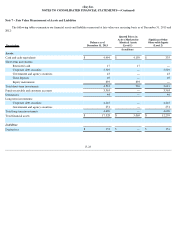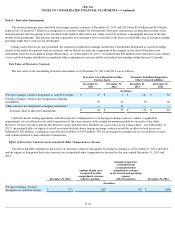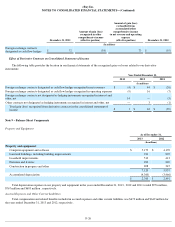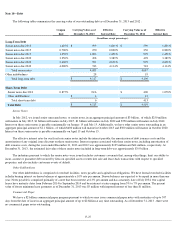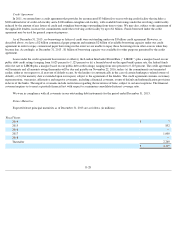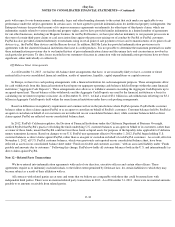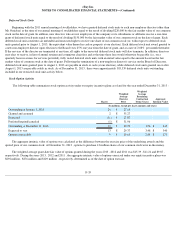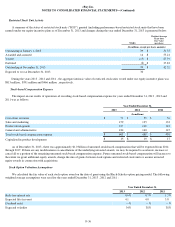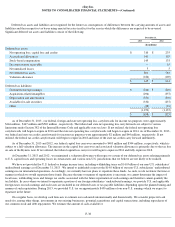eBay 2013 Annual Report Download - page 130
Download and view the complete annual report
Please find page 130 of the 2013 eBay annual report below. You can navigate through the pages in the report by either clicking on the pages listed below, or by using the keyword search tool below to find specific information within the annual report.
eBay Inc.
NOTES TO CONSOLIDATED FINANCIAL STATEMENTS—(Continued)
eBay's Korean subsidiary, IAC (which has merged into Gmarket and is now named eBay Korea), has notified its approximately
20 million
users of a January 2008 data breach involving personally identifiable information including name, address, resident registration number and
some transaction and refund data (but not including credit card information or real time banking information). Approximately 149,000 users
sued IAC over this breach in several lawsuits in Korean courts and more may do so in the future (including after final determination of liability).
Trial for a group of representative suits began in August 2009 in the Seoul Central District Court, and trial for other suits began later in the Seoul
Central District Court. There is some precedent in Korea for a court to grant “consolation money” for data breaches without a specific finding of
harm from the breach. Such precedents have involved payments of up to approximately $200 per user. In January 2010, the Seoul Central
District Court ruled that IAC had met its obligations with respect to defending the website from intrusion and, accordingly, had no liability for
the breach. This January 2010 ruling was appealed by approximately 34,000 plaintiffs to the Seoul High Court. In September 2012, the Seoul
High Court announced its decision upholding the Seoul Central District Court's January 2010 decision for three cases involving 55 plaintiffs
(who did not appeal to the Korea Supreme Court). During 2013, the Seoul High Court upheld the Seoul Central District Court's January 2010
ruling in another 18 cases involving 33,795 plaintiffs. The Seoul High Court's decision in 10 of these 18 cases has been appealed by 33,215
plaintiffs to the Korea Supreme Court, and there was no appeal in the eighty other cases. Currently, the Korea Supreme Court is reviewing a total
of 11 cases with 33,218 plaintiffs, including one case appealed from the Daegu High Court. In January 2013, the Seoul Western District Court
ruled in favor of IAC with respect to two cases filed by 2,291 plaintiffs by following the Seoul Central District Court's January 2010 ruling, and
2,284
plaintiffs proceeded to appeal the January 2013 decision of the Seoul Western District Court to the Seoul High Court. We expect decisions
in these cases in late 2014.
General Matters
Other third parties have from time to time claimed, and others may claim in the future, that we have infringed their intellectual property
rights. We are subject to patent disputes, and expect that we will increasingly be subject to additional patent infringement claims involving
various aspects of our Marketplaces, Payments and Enterprise (formerly known as GSI) businesses as our services continue to expand in scope
and complexity. Such claims may be brought directly against our companies and/or against our customers (who may be entitled to contractual
indemnification under their contracts with us), and we are subject to increased exposure to such claims as a result of our acquisitions of other
businesses or assets, particularly in cases where we are entering into new businesses in connection with such acquisitions. We have in the past
been forced to litigate such claims. We may also become more vulnerable to third-
party claims as laws such as the Digital Millennium Copyright
Act, the Lanham Act and the Communications Decency Act are interpreted by the courts, and as we expand the scope of our business (both in
terms of the range of products and services that we offer and our geographical operations) and become subject to laws in jurisdictions where the
underlying laws with respect to the potential liability of online intermediaries like ourselves are either unclear or less favorable. We believe that
additional lawsuits alleging that we have violated patent, copyright or trademark laws will be filed against us. Intellectual property claims,
whether meritorious or not, are time consuming and costly to defend and resolve, could require expensive changes in our methods of doing
business, or could require us to enter into costly royalty or licensing agreements on unfavorable terms.
From time to time, we are involved in other disputes or regulatory inquiries that arise in the ordinary course of business. These disputes
and inquiries include suits by our users (individually or as class actions) alleging, among other things, improper credit and/or collection
activities; improper disclosure of our prices, rules or policies; that our prices, rules, policies or customer/user agreements violate applicable law;
that we have not acted in conformity with such prices, rules, policies or agreements; or violations of privacy laws and policies. The number and
significance of these disputes and inquiries continue to increase as our company has grown larger, our businesses have expanded in scope (both
in terms of the range of products and services that we offer and our geographical operations) and our products and services have increased in
complexity. Any claims or regulatory actions against us, whether meritorious or not, could be time consuming, result in costly litigation, damage
awards (including statutory damages for certain causes of action in certain jurisdictions), injunctive relief or increased costs of doing business
through adverse judgment or settlement, require us to change our business practices in expensive ways, require significant amounts of
management time, result in the diversion of significant operational resources or otherwise harm our business.
Indemnification Provisions
In the ordinary course of business, we have included limited indemnification provisions in certain of our agreements with parties with
which we have commercial relations, including our standard marketing, promotions and application-programming-interface license agreements.
Under these contracts, we generally indemnify, hold harmless and agree to reimburse the indemnified party for losses suffered or incurred by the
indemnified party in connection with claims by a third
F-31




